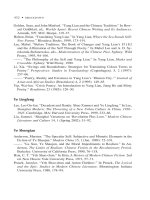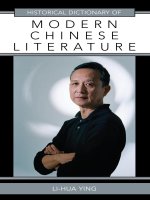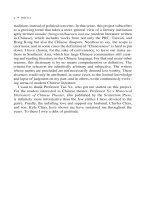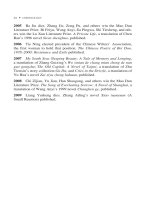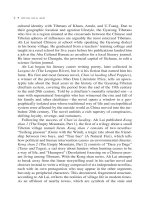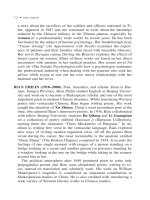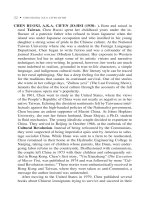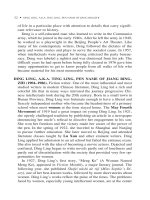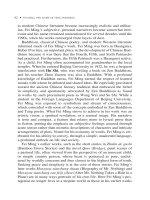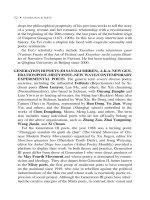"Historical Dictionary of Modern Chinese Literature" by Li-hua Ying - Part 2 pps
Bạn đang xem bản rút gọn của tài liệu. Xem và tải ngay bản đầy đủ của tài liệu tại đây (85.53 KB, 10 trang )
traditions instead of political concerns. In that sense, this project subscribes
to a growing trend that takes a more general view of a literary institution
aptly termed xiandai zhongwen/huawen wenxue (modern literature written
in Chinese), which includes works from not only the PRC, Taiwan, and
Hong Kong but also the Chinese diaspora. Needless to say, the scope is
enormous, and in some cases the definition of “Chineseness” is hard to pin
down. I have chosen, for the sake of convenience, to leave out many au-
thors in Southeast Asia, which has large Chinese communities still creat-
ing and reading literature in the Chinese language. For that and many other
reasons, this dictionary is by no means comprehensive or definitive. The
criteria for selection are admittedly arbitrary and subjective. The writers
whose names are precluded are not necessarily deemed less worthy. These
absences could only be attributed, in some cases, to the limited knowledge
and lapse of judgment on my part, and in others, to the continuously evolv-
ing arena of modern Chinese literature.
I want to thank Professor Tan Ye, who got me started on this project.
For the readers interested in Chinese theater, Professor Ye’s Historical
Dictionary of Chinese Theater, also published by the Scarecrow Press,
is infinitely more informative than the few entries I have devoted to the
genre. Finally, the unfailing love and support my husband, Charles Chao,
and son, Kyle Chao, have shown me have sustained me throughout the
years. To them I owe a debt of gratitude.
x • PREFACE
xi
The Pinyin system is used to transliterate Chinese terms, except for
names that are commonly Romanized, therefore, Taipei instead of Taibei,
Chiang Kai-shek instead of Chiang Jieshi, Hong Kong not Xianggang.
With regard to writers whose names have more than one transliteration,
the Pinyin transliteration is the primary form used with the additional
transliteration(s) provided in the dictionary as “a.k.a.” (also known as) and
in the bibliography in the parenthesis immediately following the Pinyin
name. For the sake of consistency, Beijing is used instead of Beiping, the
official name adopted during the Republican period (1911–1949).
In the Chinese convention, the surname goes before the given name.
When the author’s name is mentioned for the first time, the full name is
used; subsequently, only the surname is given. In the case of pen names,
the conventional use of the full name is adopted. Hence, Lu Xun, instead
of Lu, is used throughout the entry.
When a title is mentioned for the first time, the Pinyin title goes before
the English translation. Subsequent mentions of the same title are in Pin-
yin alone. Pinyin titles are not capitalized, except for the first letter of the
first word and proper names. English translations of Chinese titles are,
however, capitalized. Whenever possible, published English titles, shown
in italics within parentheses, are used; in the case when no English pub-
lication is available, an English translation, not italicized, is provided by
the author. When a term has an entry of its own in the dictionary, the term
appears in boldface the first time it is mentioned in an entry other than
its own. There are a few acronyms and abbreviations used throughout the
dictionary; they are listed below with their full names:
CCP: Chinese Communist Party
DPP: Democratic Progressive Party
KMT: Kuomintang (Nationalist Party)
PRC: People’s Republic of China
ROC: Republic of China
Reader’s Notes
xiii
1891 Su Manshu publishes his translation of Lord Byron’s poems,
Bailun shi xuan (Poems by Byron), the first collection of Western poetry
in Chinese.
1898 “Lun baihua wei weixin zhi ben” (The Vernacular Language as the
Basis for Reforms) by Qiu Tingliang published.
1902 Liang Qichao creates in Japan the first modern Chinese fiction
journal Xin xiaoshuo (New Fiction).
1906 Chunliu she (Spring Willow Society) established to perform spo-
ken drama.
1911 Qing dynasty toppled. Republic of China founded.
1914 Libailiu (Saturday) created to publish mainly works by authors of
the Mandarin Ducks and Butterflies school. Wan’ou zhi jia, Chinese trans-
lation of Henrik Ibsen’s A Doll’s House, premieres in Shanghai.
1915 Xin qingnian (New Youth) founded to promote xin wenxue (new
literature) and progressive ideas; its first issue is edited by Chen Duxiu, a
cofounder of the Chinese Communist Party.
1916 Chinese National Language Research Association founded.
1917 Xin qingnian publishes Hu Shi’s article “Wenxue gailiang chu
yi” (Preliminary Opinion on Literary Reform) and Chen Duxiu’s article
“Wenxue geming lun” (On Literary Revolution), formally sounding the
call for a new, revolutionary literature. Poems written in bai hua (vernacu-
lar Chinese) by Hu Shi also published.
1918 The first Romanized phonetic system introduced. Xin qingnian
publishes Lu Xun’s short story “Kuangren riji” (Diary of a Mad Man),
vernacular poems by Hu Shi, Liu Bannong, and others, translations of
Chronology
Ibsen’s plays, and Zhou Zuoren’s article “Ren de wenxue” (A Literature
for Humanity).
1919 May Fourth Movement erupts.
1920 Hu Shi’s poetry collection Changshi ji (Experiments) and Guo
Moruo’s poem “Fenghuang niepan” (The Phoenix Rising from the Ashes)
published.
1921 Wenxue yanjiu hui (Literary Society), Chuangzao she (Creation
Society), Minzhong xiju she (Society of People’s Theater), Shanghai Xiju
xie she (Shanghai Theater Association), and the Chinese Communist Party
founded. The first issue of Xiju (Theater Weekly) published. Yu Dafu’s
Chenlun (Sinking), the first collection of short stories in modern Chinese
literature, and Guo Moruo’s poems Shen nü published.
1922 Hupan shi she (Lakeside Poetry Society) founded.
1923 Xin yue shi she (Crescent Society) and Xin yue (Crescent Monthly)
founded. Lu Xun’s short story collection Nahan (Call to Arms) and Wen
Yiduo’s poetry collection Hong zhu (Red Candle) published.
1924 Yu si she (Language Society) and Yu si (Language Weekly)
founded. Zhu Ziqing’s collection of essays and poems Zongji (Traces) and
Tian Han’s collection of plays Kafei dian zhi yi ye (One Night at a Café)
published.
1925 Cheng Fangwu’s article “Cong wenxue geming dao geming
wenxue” (From Literary Revolution to Revolutionary Literature) pub-
lished, triggering the debate between Lu Xun and the Creation Society on
the nature and direction of literature. Zhimo de shi (Collection of Poems
by Zhimo) published.
1926 Chuangzao yuekan (Creation Monthly) founded; Lu Xun’s short
story collection Panghuang (Wandering), Lao She’s novel Lao Zhang de
zhexue (Mr. Zhang’s Philosophy), and Bing Xin’s collection of essays Ji
xiao duzhe (To Young Readers) published.
1927 Xu Zhimo’s poetry collection Feilengcui de yi ye (One Night in
Florence) published.
1928 Xiandai xiaoshuo (Modern Fiction Monthly) created. Ding Ling’s
short story “Shafei nüshi de riji” (Miss Sophie’s Diary), Ye Shengtao’s
novel Ni Huanzhi (Ni Huanzhi the Schoolteacher), Wen Yiduo’s poetry
xiv • CHRONOLOGY
collection Si shui (Dead Water), and Fei Ming’s collection of stories Tao
yuan (Peach Orchard) published.
1929 Mao Dun’s novel Hong (Rainbow) and Tian Han’s play Ming you
zhi si (The Death of a Famous Actress) published.
1930 Zhongguo zuoyi zuojia lianmeng (Left-wing Association of Chi-
nese Writers), Zhongguo zuoyi xijujia lianmeng (Left-wing Association
of Chinese Dramatists), and Shidai xiju she (Modern Drama Society)
founded. Literary journal Mengya (Sprouts) created.
1931 Japan invades China’s northeast. Xu Zhimo dies in a plane crash.
1932 Fei Ming’s Moxuyou Xiansheng zhuan (Biography of Mr. Nothing)
published.
1933 Mao Dun’s novel Ziye (Midnight), Ba Jin’s novel Jia (Family),
Shi Zhecun’s short story collection Meiyu zhi xi (One Rainy Evening) and
Wangshu cao (Writings of Wangshu) published. George Bernard Shaw
visits China.
1934 Taiwan Wenyi Lianmeng (The Literary and Art Alliance of Tai-
wan) founded. Cao Yu’s play Leiyu (Thunderstorm) and Shen Congwen’s
Biancheng (Border Town) published.
1935 Xiao Hong’s novella “Shengsi chang” (Life and Death), Xiao Jun’s
novel Bayue de xiangcun (Village in August) published.
1936 Lu Xun dies. Left-Wing Association of Chinese Writers disbanded.
Lao She’s Luotuo xiangzi (The Rickshaw Boy), Ai Qing’s poetry Day-
anhe—Wode baomu (Dayan River—My Wet-nurse), and Shi Zhecun’s
short story collection Meiyu zhi xi (One Rainy Evening) published.
1937 Sino-Japanese War breaks out. Li Jieren’s novel Si shui wei lan
(Ripples across a Stagnant Water) published.
1941 Japan occupies Shanghai.
1942 Mao Zedong delivers his speeches at the Yan’an Forum on Litera-
ture and Art. Feng Zhi’s Shisi hang ji (The Sonnets) published.
1943 Zhang Ailing’s stories “Qing cheng zhi lian” (Love in a Fallen
City) and “Jin suo” (The Golden Cangue), and Zhao Shuli’s novella “Li
Youcai banhua” (Li Youcai’s Rhymed Ballads) published.
CHRONOLOGY • xv
1945 Japan surrenders. Civil war breaks out between the Communists
and the Nationalists.
1946 Wen Yiduo assassinated.
1947 Chinese Writers’ Association founded in Beijing. February 28
Incident takes place in Taiwan, pitting the Nationalist government against
the Taiwanese protestors. Qian Zhongshu’s Wei cheng (Fortress Besieged)
published.
1949 The Nationalist government withdraws to Taiwan. The People’s
Republic of China (PRC) established. Liang Shiqiu’s collection of essays
Yashe xiaopin (Sketches from a Refined Cottage) published.
1951 Ding Ling’s novel Taiyang zhao zai Sanggan He shang (The Sun
Shines Over the Sanggan River) and Sun Li’s novel Fengyun jishi (Stormy
Years) published.
1952 Ding Ling’s novel Taiyang zhao zai Sanggan He shang and Zhou
Libo’s novel Baofeng zhouyu (The Storm) win the Stalin Literature Prize.
1953 Xiandai shi (Modern Poetry) founded in Taiwan.
1954 Yuan Guangzhong’s Lanse de yumao (Blue Feathers) published.
1956 Shu Xiangcheng’s novel Wu Xianggang (Misty Hong Kong) pub-
lished.
1957 Anti-Rightist Campaign launched.
1958 Great Leap Forward launched. Lao She’s play Cha guan (Teahouse)
published.
1960 Xiandai wenxue (Modern Literature) founded at National Taiwan
University. Lin Haiyin’s memoir Cheng nan jiu shi (Memories of Peking:
Southside Stories) published.
1965 Hao Ran’s novel Yanyang tian (Bright Clouds) published.
1966 Cultural Revolution launched. Lao She commits suicide.
1969 Huang Chunming’s Erzi de da wan’ou (His Son’s Big Doll)
published.
1971 Bai Xianyong’s short story collection Taipei ren (Taipei
Characters) published.
xvi • CHRONOLOGY
1975 Chiang Kai-shek dies.
1976 Mao Zedong dies. Chen Ruoxi’s Yin xianzhang (The Execution of
Mayor Yin) published.
1977 Xiangtu wenxue lunzhan (Debates on Nativist Literature) is held
between the nativists and the modernists. Cultural Revolution officially
ends. College entrance exams resumed in the PRC.
1978 Lu Xinhua’s short story “Shangheng” (Scars) published, launching
the trend of “scar literature.” Poetry journal Jintian (Today), the main plat-
form for Menglong shi (Misty poetry), founded. Deng Xiaoping consoli-
dates his power in the Chinese Communist Party and the Deng era begins
with economic reforms under way. Yang Mu shi ji (Poems by Yang Mu)
published in Taiwan and Lei sheng yu chan ming (Thunder and Songs of
Cicadas: Poems by Liang Bingjun) published in Hong Kong.
1979 Democracy Wall Movement erupts. Wang Wenxing’s novel Jia
bian (Family Catastrophe) published. Liu Xingwu’s Banzhuren (The Class
Counsellor) and Gao Xiaosheng’s Li Shunda zaowu (Li Shunda Builds a
House) published.
1980 Shanghai Literature and Art Press publishes Waiguo xiandai pai
zuopin xuan (Selected Works of Western Modernism) edited by Yuan Ke-
jia. Yao Xueyin, Gu Hua, and others win the Mao Dun Literature Prize.
1981 Mao Dun dies. Mao Dun Literature Prize established to give
awards every four years to novelists. Gao Xingjian’s Xiandai xiaoshuo
jiqiao chutan (A Preliminary Study of Modern Fiction Techniques) pub-
lished. Wang Wenxing’s modernist novel Bei hai de ren (Backed against
the Sea) published.
1982 Wang Zengqi duanpian xiaoshuo xuan (Selected Short Stories by
Wang Zengqi) published.
1983 Antispiritual Pollution Campaign launched in the PRC. Bai Xian-
yong’s novel Niezi (Crystal Boys), the first novel on the subject of homo-
sexuality by a modern Chinese writer, published. Li Ang’s feminist novel
Sha fu: Lucheng gushi (The Butcher’s Wife) published. Gao Xingjian’s
play Che zhan (Bus Stop) premiers in Beijing.
1984
Conference on “cultural root-seeking” held in Hangzhou. Ah
Cheng’s novella “Qi wang” (The King of Chess), a representative work in
CHRONOLOGY • xvii
the root-seeking movement, and Wang Meng’s Dan huise de yanzhu—zai
Yili (Light Grey Eyes—in Yili) published. Wang Zhenhe’s novel Meigui
meigui wo ai ni (Rose, Rose I Love You) published.
1985 Zhang Jie, Liu Xinwu, and others win the Mao Dun Literature
Prize. Han Shaogong’s “Wenxue de gen” (The Roots of Literature) and
Deng Youmei’s Yanhu (Snuff Bottles), two important works of the root-
seeking movement, and Ma Yuan’s “Gangdisi de youhuo” (Under the
Spell of the Gangtise Mountains), an influential experimental story based
on Tibet, published.
1986 Ding Ling dies. Taiwan’s Lianhe wenxue xiaoshuo xin ren jiang
(Unitas New Fiction Writers Prize) established. Zhongguo xiandan shi
qunti da zhan (The Grand Showcase of Chinese Modern Poetry Move-
ments) is organized by Xu Jingya and Jiang Weiyang, providing a platform
to display works of Generation III poets. The official Chinese Writers’ As-
sociation creates the Lu Xun Literature Prize to award excellence in short
story, novella, reportage, poetry, prose, literary theory and criticism, and
translation. Gu Cheng’s poem collection Hei yanjin (Eyes of Darkness)
published.
1987 Taiwan’s martial law lifted. Liang Shiqiu dies in Taiwan. Ye
Weilian’s Sanshi nian shi (Poems Written in Thirty Years) published.
1988 Chiang Ching-kuo dies. Shen Congwen dies. Lu Yao, Huo Da, and
others win the Mao Dun Literature Prize. Chen Yingzhen’s Wo de didi
Kangxiong (My Younger Brother Kangxiong) and Lin Yaode’s E dixing
(The Ugly Land) published. Su Tong’s Yijiusansinian de taowang (The
Escapes in 1934) published.
1989 Tian’anmen Prodemocracy Movement erupts. Dialogues in Para-
dise, a translation of Can Xue’s short stories, published.
1990 Gao Xingjian’s novel Ling shan (Soul Mountain) published.
1991 Eryue He’s Yongzheng Huangdi (Emperor Yongzheng) published.
1992 Wang Xiaobo’s Huangjin shidai (The Gold Times) published in
Taiwan.
1993 Poet Gu Cheng commits suicide. Jia Pingwa’s controversial novel
Fei du (The Capital City in Ruins) and Chen Zhongshi’s Bai lu yuan (The
White Deer Plain) published. Red Sorghum, a translation of Mo Yan’s
xviii • CHRONOLOGY
novel Hong Gaoliang, and Backed against the Sea, a translation of Wang
Wenxing’s Bei hai de ren, published.
1994 Chen Zhongshi and others win the Mao Dun Literature Prize. Zhu
Tianwen wins the Shibao Literature One Million (New Taiwan) Dollar
Prize with Huang ren shouji (Notes of a Desolate Man).
1995 Zhang Ailing dies. Museum of Modern Chinese Literature estab-
lished in Beijing.
1996 Xi Xi’s Fei zhan (Flying Carpet: A Tale of Fertilla) published.
1997 Hong Kong handed over to China.
1998 Zhang Guixing wins the Shibao Literature One Million (New
Taiwan) Dollar Prize. Chi Zijian, Liu Heng, Xu Xiaobin, Li Guowen, Tie
Ning, and others win the Lu Xun Literature Prize.
1999 Asia Weekly (Hong Kong) names 100 Best Chinese Fictional
Works in the 20th Century, judged by specialists from mainland China,
Taiwan, Hong Kong, Malaysia, and the United States. Mengya (Sprouts), a
literary journal based in Shanghai, establishes New Concept Composition
Contest to identify and promote young writers.
2000 Gao Xingjian awarded the Nobel Prize for Literature. Wang Anyi,
Wang Xufeng, and Ah Lai win the Mao Dun Literature Prize. Zhang
Guixing’s Hou bei (The Primate Cup) published. Notes of a Desolate Man,
a translation of Zhu Tianwen’s Huang ren shouji, published.
2001 Hua zong shijie Huawen wenxue jiang (Flower Trail World Chi-
nese Language Literature Prize), established in Malaysia, names Wang
Anyi the recipient of its first prize.
2002 Yang Lian’s long poem YI [Yi] published. Red Poppies, a transla-
tion of Ah Lai’s 1998 novel Chen’ai luoding, published.
2003 Chen Yingzhen wins the Flower Trail World Chinese Language
Literature Prize. A Dictionary of Maqiao, a translation of Han Shaogong’s
1996 Maqiao cidian, and Retribution: The Jiling Chronicles, a translation
of Li Yongping’s 1986 novel Jilin chunqiu, published.
2004 Fan Wen’s novel Shui ru dadi (Land of Harmony) and Yu Jian’s
Ling dang’an: changshi qi bu yu biantiao ji (File 0: Seven Long Poems
and Notes) published.
CHRONOLOGY • xix
